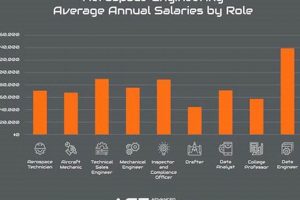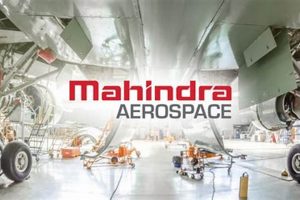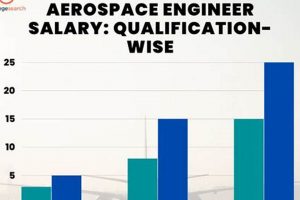Carnegie Mellon University does not maintain a dedicated Department of Aerospace Engineering. Instead, relevant coursework and research opportunities are primarily found within the Mechanical Engineering Department and, to a lesser extent, in other engineering departments like Electrical and Computer Engineering. The curriculum allows students to pursue studies and projects related to flight, propulsion, and aerospace systems.
While not offering a specifically labeled program, the integrated nature of Carnegie Mellon’s engineering departments allows for interdisciplinary exploration of aerospace-related topics. This structure fosters innovation by bringing together expertise from different areas, such as robotics, materials science, and computer science, contributing to advancements applicable within the aerospace industry. Historically, this interdisciplinary approach has been a hallmark of the university’s engineering programs.
Therefore, those interested in pursuing studies related to flight and space exploration at Carnegie Mellon University will typically find opportunities through the Mechanical Engineering Department and various research labs. Students can tailor their education towards these fields by carefully selecting courses and research projects that align with their interests. Further details can be found on the respective department websites.
Guidance for Aspiring Aerospace Engineers at Carnegie Mellon University
Individuals interested in aerospace-related pursuits at Carnegie Mellon University should be aware that a dedicated “aerospace engineering” department does not exist. The following provides guidance for navigating the university’s academic structure to achieve relevant educational and research experiences.
Tip 1: Focus on Mechanical Engineering: The Mechanical Engineering Department is the primary hub for aerospace-related studies. A strong foundation in core mechanical engineering principles is essential.
Tip 2: Explore Relevant Coursework: Within Mechanical Engineering, select courses focusing on fluid mechanics, thermodynamics, heat transfer, control systems, and structural analysis. These courses provide the technical background necessary for aerospace applications.
Tip 3: Seek Research Opportunities: Actively pursue research opportunities within faculty labs working on projects with aerospace relevance. This includes projects involving propulsion, aerodynamics, robotics, or materials for extreme environments.
Tip 4: Leverage Interdisciplinary Resources: Carnegie Mellon’s strength lies in its interdisciplinary nature. Consider coursework or projects that combine mechanical engineering with electrical and computer engineering, robotics, or materials science.
Tip 5: Network with Faculty: Establish relationships with faculty members whose research aligns with aerospace interests. They can provide valuable mentorship and guidance.
Tip 6: Consider a Master’s or Ph.D.: A graduate degree allows for more specialized study and research in a chosen area of aerospace engineering. This can compensate for the lack of a dedicated undergraduate program.
Tip 7: Review Departmental Research: Thoroughly investigate the research projects conducted within the Mechanical Engineering and related departments. Identify areas of particular interest that align with career goals.
By strategically navigating the Mechanical Engineering Department and leveraging the university’s interdisciplinary resources, individuals can cultivate a robust educational experience aligned with aerospace engineering interests.
This focused approach allows prospective students to tailor their education and research to the specific demands of the aerospace industry despite the absence of a dedicated departmental program.
1. Mechanical Engineering Focus
The Mechanical Engineering Department at Carnegie Mellon University serves as the primary point of access for students interested in pursuing studies related to aerospace. Given that a dedicated department focusing on aerospace engineering does not exist at the university, Mechanical Engineering provides the foundational knowledge and skill sets that are directly transferable to the aerospace sector. Students within this department can specialize their coursework and research to align with aerospace-related topics.
The importance of the Mechanical Engineering Department stems from the core principles it teaches, which are fundamental to aerospace engineering. These principles include fluid dynamics, thermodynamics, heat transfer, control systems, and structural analysis. For example, understanding fluid dynamics is crucial for designing aerodynamic surfaces, while thermodynamics is essential for designing efficient propulsion systems. By mastering these core principles within the Mechanical Engineering curriculum, students gain a solid base upon which to build more specialized knowledge in aerospace. Many faculty members within the Mechanical Engineering Department conduct research directly applicable to the aerospace industry, providing further opportunities for students to engage with real-world problems.
In summary, while Carnegie Mellon lacks a designated aerospace engineering department, the Mechanical Engineering Department functions as a vital substitute, providing both the fundamental education and the research opportunities necessary for individuals aspiring to careers in the aerospace field. Success depends on proactive course selection, research engagement, and faculty mentorship within Mechanical Engineering, allowing students to pursue aerospace-related interests effectively.
2. Interdisciplinary Opportunities
The absence of a dedicated aerospace engineering department at Carnegie Mellon University underscores the significance of interdisciplinary opportunities for students interested in pursuing aerospace-related careers. The university’s structure promotes collaboration across departments, enabling students to integrate knowledge from diverse fields to address complex aerospace challenges. This interdisciplinary approach becomes a necessity, rather than a mere option, for those seeking a comprehensive aerospace education in the absence of a specialized department.
For example, students might combine coursework in Mechanical Engineering with robotics expertise from the Robotics Institute to develop advanced autonomous flight systems. Alternatively, materials science knowledge can be integrated with propulsion concepts to create lighter, more efficient aerospace components. Furthermore, computer science skills are invaluable for developing sophisticated flight control software and data analysis tools for aerospace applications. These examples demonstrate how the ability to connect diverse areas of knowledge becomes crucial for aspiring aerospace engineers at Carnegie Mellon University.
The practical significance of this interdisciplinary approach lies in its ability to prepare graduates for the evolving demands of the aerospace industry. Real-world aerospace projects often require expertise from multiple engineering disciplines, making graduates with interdisciplinary skills highly sought after. While the lack of a dedicated aerospace department presents a challenge, the wealth of interdisciplinary opportunities at Carnegie Mellon offers a viable alternative pathway for students to acquire the skills and knowledge necessary to succeed in aerospace-related fields. This integrative approach is, in effect, the de facto method for pursuing aerospace-related expertise at the university.
3. Research-Driven Pathways
Given the absence of a dedicated aerospace engineering department, research-driven pathways constitute a primary avenue for Carnegie Mellon University students to engage with aerospace-related fields. Because formal degree programs labeled “aerospace engineering” are unavailable, participation in research projects becomes critical for gaining specialized knowledge and practical experience. These pathways are not merely supplementary; they represent a core mechanism for students to develop expertise applicable to the aerospace sector.
The importance of research is underscored by the hands-on experience it provides. Students can participate in projects related to areas such as advanced materials for aerospace applications, autonomous flight control systems, or the development of novel propulsion technologies. For instance, a student might join a research team focused on designing lightweight structures for aircraft using composite materials. This experience allows them to apply theoretical knowledge learned in the classroom to real-world problems, providing invaluable skills that are highly valued by aerospace employers. Furthermore, such research involvement often leads to publications in peer-reviewed journals and presentations at conferences, further enhancing a student’s credentials.
Consequently, for individuals seeking to pursue careers in aerospace-related fields via Carnegie Mellon University, focusing on and actively seeking out research opportunities is paramount. The university’s emphasis on research, coupled with its strength in related engineering disciplines, makes this an effective alternative to a direct aerospace engineering program. While a departmental offering may provide a structured curriculum, research-driven pathways offer a personalized and practically focused route to specialized knowledge, making it essential for navigating the absence of a dedicated aerospace engineering program.
4. Faculty Expertise
The absence of a dedicated aerospace engineering department at Carnegie Mellon University makes faculty expertise within related departments, particularly Mechanical Engineering, crucial for students seeking aerospace-related careers. The strength and depth of faculty expertise in areas like fluid mechanics, thermodynamics, materials science, and control systems directly compensate for the lack of a formal aerospace program. Faculty members with research interests and experience in aerospace applications provide mentorship, research opportunities, and specialized knowledge that would otherwise be delivered through dedicated aerospace courses. Their expertise shapes the available curriculum and research projects, influencing the type and quality of aerospace-related education students can access. For example, a professor specializing in computational fluid dynamics can guide students in simulating airflow over aircraft wings, a core skill for aerospace engineers.
The practical significance of faculty expertise extends to career prospects for graduates. The reputation and connections of faculty members within the aerospace industry can open doors for internships and job opportunities. Faculty can also provide valuable guidance in navigating the aerospace job market, which often requires specialized skills and experience. Consider a faculty member whose research focuses on developing novel materials for spacecraft. Such expertise not only contributes to cutting-edge research but also positions students working in that lab for opportunities at companies specializing in space exploration or satellite technology. The presence of highly regarded faculty therefore acts as a surrogate for a formal aerospace program, providing access to relevant knowledge and industry connections.
In summary, while Carnegie Mellon lacks a designated aerospace engineering department, the university’s strength in related fields, coupled with the high caliber of its faculty, provides a viable alternative pathway for aspiring aerospace engineers. Access to knowledgeable and experienced faculty is not merely beneficial; it is essential for navigating the curriculum, pursuing relevant research, and securing career opportunities in the aerospace industry. The degree to which students can leverage this faculty expertise largely determines the success of their aerospace-related pursuits at the university.
5. Graduate Specialization
Given that Carnegie Mellon University does not offer a dedicated undergraduate program in aerospace engineering, graduate specialization becomes a pivotal element for students aiming to pursue careers in this field. The university’s existing strengths in related disciplines, such as mechanical engineering, robotics, and materials science, provide a foundation upon which graduate students can build specialized aerospace knowledge.
- Focused Research Opportunities
Graduate programs allow for in-depth research on specific aerospace-related topics. Students can join research groups working on propulsion systems, autonomous flight control, or advanced materials for extreme environments. These research opportunities provide practical experience and specialized knowledge not available through general undergraduate coursework. The specific research undertaken becomes the primary means of specialization.
- Tailored Coursework Selection
While a formal aerospace engineering curriculum is absent, graduate students can select courses across multiple departments to create a personalized aerospace focus. This might involve taking advanced fluid dynamics courses in mechanical engineering, control theory in electrical engineering, or materials science courses focused on aerospace applications. This tailored approach allows students to build a skill set directly relevant to their specific aerospace interests.
- Faculty Mentorship and Guidance
Graduate students benefit from close mentorship from faculty members specializing in aerospace-related research. Faculty can guide students in selecting appropriate coursework, identifying research opportunities, and navigating the aerospace job market. This mentorship is particularly critical in the absence of a dedicated aerospace department, as faculty expertise becomes the primary source of specialized guidance.
- Networking and Industry Connections
Graduate programs provide opportunities to network with industry professionals through conferences, workshops, and research collaborations. These connections are invaluable for securing internships and job opportunities in the aerospace sector. These interactions compensate for the lack of a dedicated aerospace department’s built-in industry connections.
In summary, graduate specialization serves as a critical pathway for students interested in aerospace engineering at Carnegie Mellon University. By focusing on research, tailoring coursework, seeking faculty mentorship, and building industry connections, graduate students can acquire the specialized knowledge and skills needed to succeed in aerospace-related careers, effectively addressing the lack of a dedicated undergraduate program.
6. Departmental Integration
Due to the absence of a dedicated aerospace engineering department, departmental integration is paramount at Carnegie Mellon University for students seeking aerospace-related education and research opportunities. This integration is not simply beneficial; it is a structural necessity that allows students to assemble a quasi-aerospace engineering curriculum by drawing resources from various established departments. The university’s organizational design compels students to leverage the strengths of multiple departments, creating a synthesized educational experience analogous to a conventional aerospace engineering program. Consequently, the effectiveness of this integration directly determines the availability, quality, and accessibility of aerospace-related studies at the institution.
A specific example illustrating this integration involves a student researching advanced materials for high-speed flight. Such a student may be based in the Mechanical Engineering department for core coursework in solid mechanics and heat transfer. However, they might collaborate with faculty in the Materials Science and Engineering department for expertise in alloy development and characterization. Further, they may consult with faculty in the Electrical and Computer Engineering department for sensor development related to material stress and strain monitoring. This collaborative approach provides a depth and breadth of knowledge that would be difficult to achieve within a single department. The success of this integration relies on clearly defined inter-departmental research collaborations and a flexible curriculum that allows students to pursue relevant coursework regardless of their primary departmental affiliation.
In conclusion, departmental integration at Carnegie Mellon University is not merely a feature of the academic environment; it is the foundational mechanism that enables aerospace-related education and research in the absence of a dedicated department. While this approach presents challenges in terms of curriculum coordination and resource allocation, it also fosters interdisciplinary thinking and collaboration, preparing students for the complex and multifaceted nature of modern aerospace engineering. The active cultivation and support of departmental integration is essential for maximizing the educational opportunities available to students interested in aerospace at Carnegie Mellon University, effectively acting as a de facto aerospace engineering program.
Frequently Asked Questions
This section addresses common questions regarding the availability of aerospace engineering studies at Carnegie Mellon University. It aims to provide clarity for prospective students and others interested in pursuing careers related to flight and space exploration within the university’s academic framework.
Question 1: Does Carnegie Mellon University offer a dedicated Bachelor’s degree in Aerospace Engineering?
No, Carnegie Mellon University does not have a formally designated undergraduate program leading to a Bachelor’s degree in Aerospace Engineering. However, relevant coursework and research opportunities are available through other departments.
Question 2: If a dedicated program does not exist, how can a student pursue aerospace-related studies at Carnegie Mellon?
Students can focus on Mechanical Engineering as a primary field of study, then strategically select courses and research projects that align with aerospace interests. Interdisciplinary studies involving Electrical and Computer Engineering, Materials Science, and Robotics can further enhance a student’s preparation for aerospace careers.
Question 3: What research opportunities are available for students interested in aerospace?
Various research labs and faculty members conduct research relevant to aerospace, including areas such as propulsion systems, autonomous flight control, advanced materials for extreme environments, and robotics for space exploration. Active participation in these research endeavors is crucial for gaining specialized expertise.
Question 4: Does the absence of a dedicated program negatively impact career prospects in the aerospace industry?
Not necessarily. While a dedicated program may provide a more structured curriculum, the interdisciplinary approach and research-intensive environment at Carnegie Mellon can prepare graduates for diverse roles in the aerospace sector. Success hinges on strategic course selection, proactive research engagement, and effective networking.
Question 5: What graduate programs at Carnegie Mellon are most relevant for students seeking aerospace specializations?
Graduate programs in Mechanical Engineering, Robotics, Materials Science, and Electrical and Computer Engineering offer opportunities for specialization in aerospace-related areas. Students can tailor their coursework and research to focus on specific aspects of aerospace engineering, such as propulsion, aerodynamics, or space systems.
Question 6: How important is faculty mentorship for students pursuing aerospace interests at Carnegie Mellon?
Faculty mentorship is extremely important. Faculty members with expertise in relevant areas can provide guidance in course selection, research opportunities, and career planning. Their experience and connections within the aerospace industry can significantly benefit students seeking to enter the field.
In summary, while a formally designated aerospace engineering program is absent at the undergraduate level, Carnegie Mellon University provides alternative pathways through strategic departmental integration, research engagement, and graduate specialization. Success requires proactive planning and a commitment to interdisciplinary learning.
The subsequent sections will delve deeper into strategies for maximizing the available resources to achieve aerospace-related career goals at Carnegie Mellon University.
Conclusion
This exploration clarifies that Carnegie Mellon University does not possess a department explicitly designated as “aerospace engineering.” Despite this, a pathway toward aerospace-related expertise exists through strategic engagement with the Mechanical Engineering Department, interdisciplinary collaboration, research-driven learning, faculty mentorship, graduate specialization, and deliberate departmental integration. The absence of a dedicated program necessitates a proactive and customized approach to achieve career goals in the aerospace field.
While the lack of a formal “aerospace engineering” department presents a unique challenge, it also fosters an environment of resourcefulness and interdisciplinary collaboration. Prospective students are advised to thoroughly investigate the research landscape, connect with relevant faculty, and carefully plan their academic trajectory to maximize their potential for success in aerospace-related careers. This calculated approach allows students to thrive in the complex world of aerospace by using knowledge obtained across departments.







